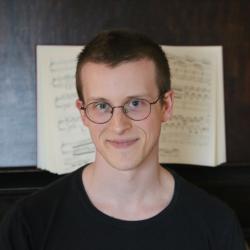- Music
- About
- Composition and Theory
- Music Technology
- History and Culture
- Performance
- Degree Requirements
- Class Schedule
- Edward and Joyce Linde Music Building
- Graduate Level Courses
- Theater Arts
- News
- Events
- People
- View/Listen
- Space/Resources
- Give


The program will feature: Scarlatti, selected Sonatas: D minor, K. 1; F major, K. 17; D minor, K. 141; Schubert, Four Impromptus, Op. 90 / D. 899; Rameau, Suite in A minor, from Nouvelles Suites de Pièces de Clavecin; Messiaen, Le baiser de l’Enfant-Jésus, from Vingt Regards sur l-enfant-Jésus.
About Daniel Parker
His “enviable keyboard virtuosity” and “impromptu generosity” praised as “ravishing” by the Boston Musical Intelligencer, Daniel Parker receives a Bachelor of Science in Music from the Massachusetts Institute of Technology in June, 2016. He will pursue his Master of Music in Piano beginning this September at The Juilliard School in New York City, under the tutelage of Jerome Lowenthal.
A native of Johnson City, New York, he began playing the piano at age 6, and was largely self-taught in the classical style until high school. His past teachers include Margaret Reitz; Robert Satterlee (Interlochen Arts Camp, summer, 2008); John Covelli; Anton Nel (Aspen Music Festival and School, summer, 2015); and David Deveau. An accomplished baritone, as a freshman and sophomore he pursued study in classical voice with Kerry Deal, supported by the MIT Music Department’s Emerson Scholarship and then Fellowship. He has received instruction in chamber music from Marcus Thompson, Jean Rife, and David Deveau, and participated in masterclasses by Jon Nakamatsu, Hung-Kuan Chen, and Steven Osborne.
Since switching to focus on piano in his junior year, his Emerson Fellowship has supported him to study with Boston-based Russian master pianist Sergey Schepkin. As a Fellow, he has presented numerous solo recitals in MIT’s Killian Hall, including a performance of the complete Book I of J. S. Bach’s Well-Tempered Clavier in December, 2014.
Possessing wide interests beyond piano performance, Daniel holds a concentration in Political Science and has an enduring commitment to social justice work and peace and nonviolence action. He spent most of 2013 at Tassajara Zen Mountain Center, delving into Zen Buddhist meditation practice and philosophy. His interest in contemplative spirituality led him to join the Quaker Voluntary Service as a Fellow in the academic year 2015-2016, where he has lived in intentional community based on Quaker principle, studied Quaker thought and practice, and held a full-time position as a Peace Fellow at the Louis D. Brown Peace Institute, a Dorchester nonprofit that serves families impacted by homicide.
In 2012, he was awarded the MIT Music Section’s Naess Certificate of Distinction “in recognition of exceptional talent and commitment to performance at MIT,” and in 2015, he received the Philip Loew Memorial Award “in recognition of creative accomplishment in music.” His musicological writing received the 2015 Kelly Douglas Essay Prize for the best undergraduate essay across the entire MIT School of Humanities, Arts, and Social Science. That summer, he received a major grant from the Council for the Arts at MIT to attend the Aspen Music Festival and School. In fall of 2015, he won Third Prize at the Thousand Islands International Piano Competition, and was named one of Business Insider’s “15 Incredibly Impressive Students at MIT.” In January of 2016, he was a winner of the MIT Symphony Orchestra Concerto Competition, leading to a performance of the first movement of Brahms’ Piano Concerto No. 2 in B-flat with the orchestra on April 30th.
Most recently, he was named recipient of the Council for the Arts at MIT’s Louis Sudler Prize, an Institute-wide honor “presented to a graduating senior who has demonstrated excellence or the highest standards of proficiency in music, theater, painting, sculpture, design, architecture or film.” This summer will see him attend Pianofest in the Hamptons, under the direction of Paul Schenly, and compete in the Midwest International Piano Competition.